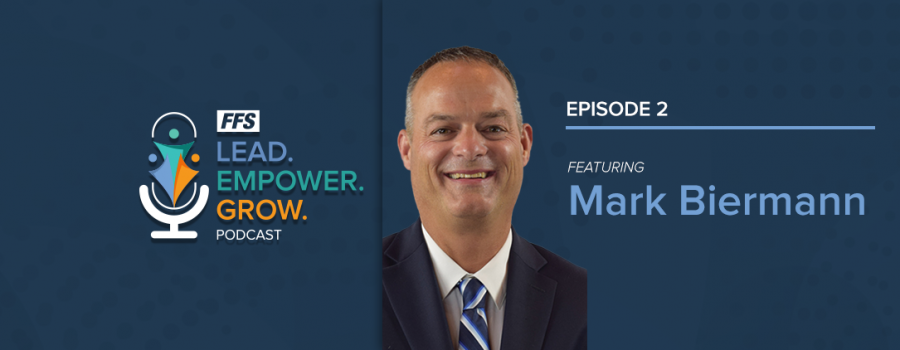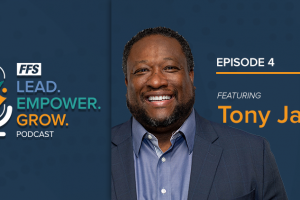This week marks the first episode of Lead. Empower. Grow. , a new podcast from First Financial Security that shares stories from entrepreneurs who are helping their communities through financial services. For each podcast episode, interesting parts of our conversation will be excerpted and featured for our blog.
To begin, we spoke with Mark Biermann, a familiar speaker at our national events who had a meteoric rise to Executive Field Chairman with FFS. We spoke to him about his transition to insurance from the home building industry, the importance of positivity to his success, and how his quick response to the pandemic actually helped his business grow.
See below for an excerpt of our conversation — you can listen to the full episode here.
Mark, what did you do before joining FFS? Why did the FFS opportunity appeal to you?
Bridget and I owned a home building, real estate, and land development company that started back in 1989. What happened in 2008 basically changed that whole business model. The profit margins went way down, and we had to make $10,000 a day to break even.
Then, when we saw the FFS business model, when we saw the products, the living benefits, I’m thinking, “I watched so many people lose their homes when they became ill or injured — 80% of the time it was [due to] illness and injury, not losing your job. We have something here that can make sure people don’t lose their homes.” Those were our exact first thoughts that we had when we saw the FFS opportunity.
What was appealing about these products? What made you think that this was a solution that could really help these families?
A friend of mine — actually, I should really say a mentor of mine — Charlie Lind introduced me to FFS, and he said, “This is something that I think you might be able to help business owners with.” The bottom line is, you know, if Charlie never brought it to us that day — I mean, we are so grateful for him bringing it to us. It’s hard to put into words, “How did I get started?” It’s as simple as that right there.
Knowing also that we can touch so many people’s lives, that was really what our focus became: touch as many people’s lives as we can and put that type of business model together.
So that leads me to my next question, which is about the GOALL Program. You really marketed yourself with the GOALL program, and I know that it was specifically designed to address business owners. How did you get started with that? What kind of success have you seen with it?
Being in this business, I knew that we had to have something that we would market ourselves to other people and have a vehicle to be able to do that. With no marketing, nobody knows you’re out there. When we started, it didn’t sound very good because the technical name of the product is really “life insurance with living benefits and a supplemental income,” so when we met with business owners, I started to say, “We offer the GOALL program.” They’d say, “What’s the GOALL Program?” and I’d say, “Growth-Only Automated Life and Legacy Program.” It was a game-changer. Most people out there are just on their own and try to go door-to-door, one-on-one — you must have a product that creates curiosity.
What did you feel were the big challenges starting out, and what were some of the things that you did to overcome them?
When we first got into the business, the biggest thing that we wanted to understand was the products, so we could look at somebody and know, “This is the product that they need.” For basically the first five months, we started off a little bit slow. We really wanted to educate ourselves.
The game-changer happened when we went to Leader’s Convention for the first time. It was a big event — we started talking to each of the carriers, and they were so willing to help us out and answer our questions. Then, during the Convention, we got to listen to some of these top leaders talk about their success stories. Six months later we hit Champions Club.
The big thing that happened at that Leader’s Convention was the belief went into our hearts. I think that’s a big downfall for a lot of people — they don’t allow it to enter their hearts. They just want to dip their toe in and see how it goes. We made it a mindset that we were going to do this, and we followed through with our game plan that we laid down after that Convention. We spent 24 hours putting together our business plan and we stuck to it. Success doesn’t happen overnight. You have to be patient.
We named the podcast Share Your Umbrella because umbrellas are an insurance symbol — they cover, shelter, and help people. For us, the umbrella is not only the products that shelter our clients from risk but also the opportunity to build a business in the financial services industry.
With that in mind, do you have any stories of sharing that umbrella with others? What does that concept mean for you?
Giving somebody the ability to be self-employed, become successful and make great money — it’s very satisfying when you see somebody that you brought into this business have success. It’s an amazing feeling. On Friday nights, Bridget and I recap our week a little bit. It’s normally about how many people’s lives we touched. It isn’t about the money you make. We basically say, “Okay, we helped 25 people this week. Wow!”
When we bring people in with the FFS opportunity, we put a lot of emphasis on education. We do a 20-hour training where we bring the people in and we do a deep dive into how you do this business. That has been huge for us, taking that extra time with the new people and saying, “Here’s how our system works, and here’s why we do it.” It’s about getting the people into the right mindset.
What has it been like for you in 2020? How have you been able to keep your business going? How did you pivot? What have been some of the things that you’ve done that have been successful in this year?
Well, you know, when COVID kicked in, we knew immediately that we had to reach out to our people. In March, we immediately started calling our clients and saying, “Hey, you did not lose any money when the stock market went down.” And they’d say, “Really? Is that really true? I got a friend that just told me she looked at her 401k and lost all this money.” I’d say, “Hey, I can help her too.” We started getting so many referrals. We were shocked. So that was a huge, huge push for us.
If having success during a pandemic is a mindset, and just getting the message out there — “Here’s how I can help you,” — using that mentality definitely changes the whole thing. I teach over and over again: you have to find their need or their problem and create a belief that you can help them. And you have to be passionate about it. Talking to people and saying, “You didn’t lose any money,” is music to their ears. Absolute music to their ears. People work too hard to lose their money.
I have a note right beside me that says, “Stay positive.” Some people have a struggle with staying positive because all they do is focus on the negative. But if you write down what happened all day on a bad day, and then weigh out the negative versus the positive, you’re going to find that most of the events are positive. I told people to look at 2020 overall and ask, “What are the positives?” Maybe it’s “I learned how to do zoom meetings.” “I learned that I could improve my business model.”
A couple of weeks ago, I was doing field training with one of my colleagues. Fifteen minutes before the appointment, we get a phone call: the person had to cancel because of a family emergency, which is very understandable. My colleague right away focused on the negative, but if I ever have an appointment cancel on me, for whatever reason, I set up two new appointments before I end my day. Then, at the end of the day, I can think, “It’s okay that that person canceled — I got two new appointments.”
Looking forward, what are some of the goals that you have for 2021? What is your vision for growing your business in the new year?
Bridget and I actually spent some time on this last weekend while doing our goal setting. Our goal is to be at $1.2 million by the end of 2021. Is it easy? No. But can it be done? Absolutely. Having the right team in place, it can be done.
I tell the people on our team that the FFS business model isn’t the dream. Just joining isn’t going to get you to the dream. You have to do something to make that happen — use what FFS has to offer because FFS is the vehicle that’s going to get you there.
Listen to our full conversation with Mark Biermann for more valuable insight into running your own business.
FFS Agents – share this post with your networks using our resources in the ABO.




